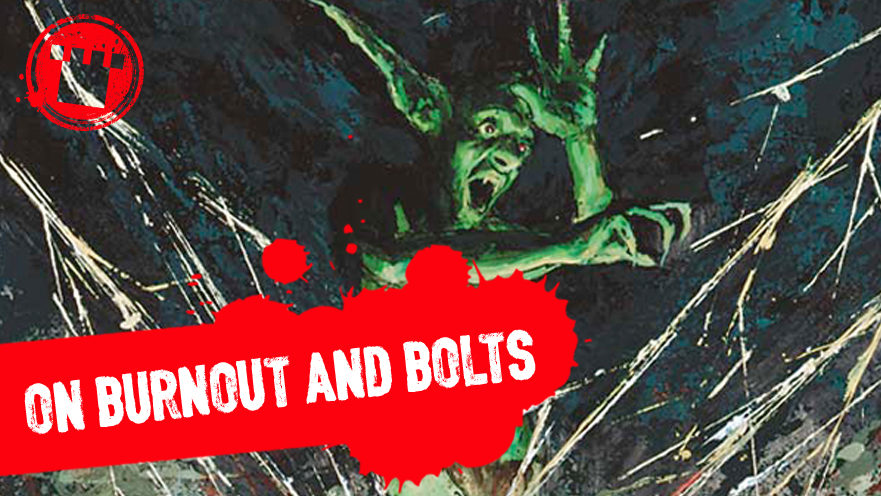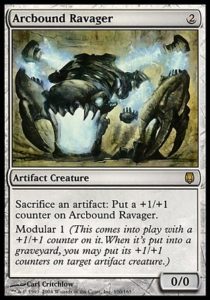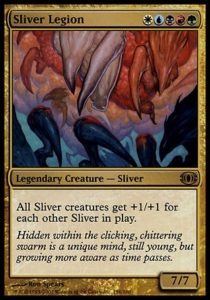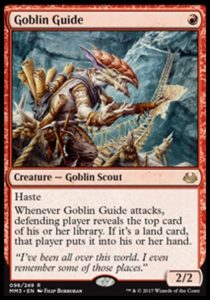All of us know how great it can be to play Magic: The Gathering. The epic countermagic battles, the topdeck wars, the glow of preview season…these are the things that keep us engaged with the game and all it has to offer. It’s easy to look around and see people whose lives have been enriched by playing this great game we all love. But what about those times when Magic isn’t enriching you? I’m not just talking about a frustrating loss, or about drawing too many lands against an aggro deck. What about those times when Magic itself begins to feel like a chore, a Sisyphean boulder to pushed along out of habit, obligation, or a social status quo? What happens when being burned out by yet another Lightning Bolt turns into actual, sustained, personal burnout?
Allow me to share with you all a personal story. The year was 2004. A much-younger me was just hitting my peak in competitive Magic. The most recent expansion was Darksteel, which brought a smorgasbord of powerful cards into the format, most notably Arcbound Ravager and Skullclamp. Like many other players, I had managed to leverage these overpowered Standard cards into sustained tournament success. However, unlike many other players, I was only fifteen years old at the time. Nonetheless, I had placed first at a Junior Super Series tournament and was now the proud owner of an invitation to play at US Nationals in Kansas City.
2004 Nationals was a huge event, made all the more dramatic by the announcement that Skullclamp would be banned following its conclusion. This was Ravager Affinity’s last hurrah (or at least until they adopted Cranial Plating), and excitement was in the air. As a young kid who had devoted years of free time to Magic, this should have felt like a crowning achievement to me. Yet, the experience would prove to be the catalyst for my first extended break from the game.
Burnout can be caused by many things. For me, it was the condescension and sneering insults I received from older players. Older players were not thrilled to have a teenager competing at their level, and for the first time, I felt like the Magic community was not for me. Two days and sixteen rounds of grueling Magic later, I finished with a mediocre win-rate, along with a deep exhaustion with the very idea of Magic. My joy for the game was gone, replaced by a sense of weariness at playing in yet another FNM, as well as a constant paranoia that those older than me were laughing at me behind my back. By the time Champions of Kamigawa was released six months later, I had fully stopped playing.
I know I am not the only one who has felt unwelcome in the Magic community. Magic culture has improved quite a bit since 2004, but we still have miles to go, and the feeling of exclusion is a very common cause of Magic burnout. But burnout can also result from our inability to live up to our ambitions. Whether it’s qualifying for the Pro Tour, or merely going undefeated at your local FNM, if that one goal continues to allude you, it’s only natural to start asking yourself if all the effort is worth it. Without a strong system of support to lift you up when the despair starts creeping in, it can feel all too tempting to walk away from your lands and spells for good.
Thankfully, two forces drove me to return to this wonderful game.
IT’S DANGEROUS TO GO ALONE
I took my hiatus from Magic fully expecting to never come back. I’d kept some of my cards around, and I’d pull out my collection of Slivers from time to time and dork out in secret, but I never thought I’d sleeve up a deck again, let alone go on to play in FNM every week. The thing that pulled me back was my circle of friends. During my first year of college, a buddy from high school called me out of the blue, asking if I’d ever played Magic, and if I wanted to join his draft that afternoon. That one invitation helped drag me back into the game I love, but also demonstrated to me the power of tying your love of the game to the people that you are playing with.
It’s been over ten years since I was invited back in, and my circle of Magic friends has changed and shifted and grown over and over. Yet, throughout that time, the one constant has been that the people I bond with over Magic are people who encourage me to stay positive and find the joy in the game; they remind me that the frustrations that Magic causes are fleeting. They are people who bring diverse viewpoints to the table, from many backgrounds, and often with wildly different personal goals. Yet, I know that if I asked for their support with any Magic issue I was struggling with, they would provide compassion and wise advice.
For those slogging through the trenches of Magic burnout, I cannot emphasize how important it is to avoid slogging alone. If at all possible, find a community of like-minded players, or even just players who you enjoy talking to. Those friendships will be much more stable than your ability to draw the right number of lands each game, and the stings of losses and missed opportunities hurt less when you have a trusted, friendly face to commiserate with. If you can’t find players in your local community that mesh well with you, try to find your tribe online. Even a simple phone call with a best friend across the country can do wonders for your internal positivity and focus.
HOW I LEARNED TO STOP WORRYING AND LOVE THE RED DECK
In my own Magic community, I am known as “the red deck guy.” In every sanctioned Constructed event I’ve played in since 2010, I’ve sleeved up a deck with some number of basic Mountains in it. People will ask me why I am so consistent about playing red burn decks, even at times when it’s not strong in the metagame. The answer, ironically enough, lies in my post-Nationals burnout. When competitive Magic left me feeling isolated and futile, I chose to come back to Magic on one singular condition: that I always have fun while playing.
For me, nothing in Magic compares to the thrill of burning an opponent’s life total to ashes, of turning those Goblin Guides sideways and not caring about what the attack trigger reveals. That doesn’t mean I don’t care about winning – my competitive spirit has never gone away – but I want to win on my terms, and in ways that bring me joy. What’s more, my years and years of experience playing aggro and burn strategies have let me cultivate many skills that are relevant across formats. I’ve put in the time and can confidently say that I’m quite the skilled aggro player as a result.
I may not recommend taking as extreme a course as I did – not everyone wants to commit themselves so fully to a single archetype. However, if you’re coming back to Magic after some time away, it can help tremendously to identify what helps you feel joy and fun while playing. Maybe you know you’re a control player, and always having access to a board wipe is your comfort zone. Maybe you simply know you enjoy playing multiple colors. Regardless, this gives you a lifeline and a sense of identity as a Magic player. It gives you a starting point to return to again and again when things feel frustrating or hopeless. For me, I know that no matter how disillusioned I get with the game, sleeving up Lightning Bolts feels just like hugging a cherished stuffed animal from my childhood.
Magic culture still struggles to acknowledge how much work it takes to play the game. The more competitive you get, the more work and energy you pour into your matches, your decklists, and your strategies. As players, we’re encouraged to master the game’s systems and leverage our mastery over other people. When those plans go awry, it’s easy to let the disappointment feel like a personal failing, and to have it poison our relationship with the game. Next time you feel that burnout creeping into you, remember what keeps you tethered to Magic. Find your places of strength and support, both external and internal, and weather those storms until you find the joy of Magic again.
Header image: “Fireblast” by Michael Danza

Simon is a Retail Sales Specialist at Mox Boarding House Seattle. He started playing Magic during Odyssey block, finding success on the Junior Super Series circuit and eventually playing at the 2004 US Nationals. After a multi-year break from the game, he was brought back with the reprinting of his favorite card, Lightning Bolt, in the 2010 Core Set. Simon is a loyal Red Deck Wins player and is always doing his best to win with Mountains in every Constructed format. He has a deep affection for the Magic storyline and will happily discuss the peculiarities of the Kamigawa block with you upon request.




